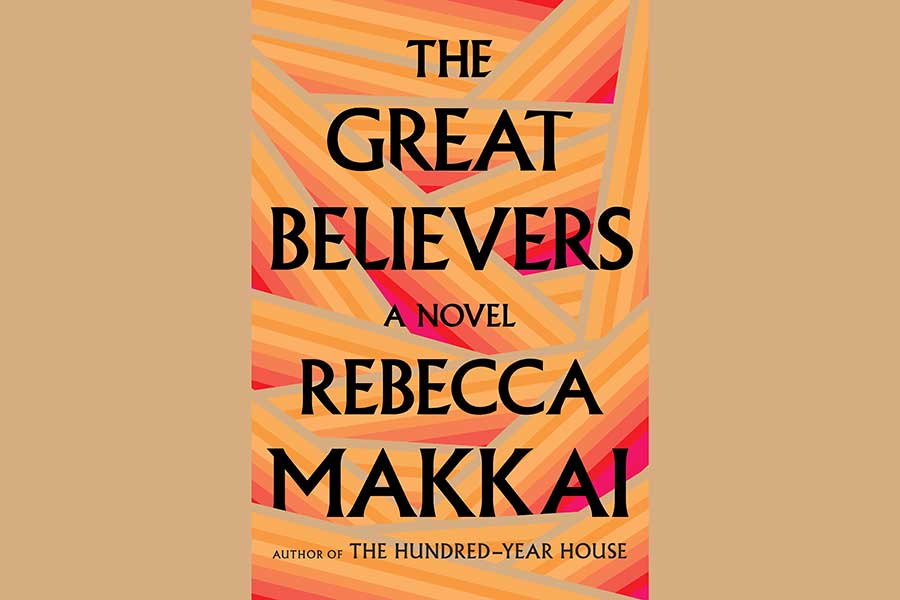Rebecca Makkai’s masterful novel, “The Great Believers,” opens in 1985 with Yale Tishman attending a memorial service for Nico Marcus — his first real friend in Chicago — who has just died from AIDS. Nico’s younger sister, Fiona, is the protagonist of the book’s alternating chapters, which are set in 2015. She is heading to Paris to look for her daughter, Claire, whom she has not seen in some time.
The two narrative strands overlap, juxtapose and connect several times over the course of an absorbing 400-plus-page book. But the author also gives readers mini-cliffhangers at the end of almost every chapter. Readers may want to skip ahead to see what happens next. That is how good Makkai’s storytelling is.
“The Great Believers” introduces several characters, all of whom are distinctive and engaging. Yale works as a fundraiser for the fictional Brigg Gallery at Northwestern University, where he seeks out art and donations. He is hoping to secure a collection of paintings from Fiona’s great-aunt Nora, a woman who lived in Paris in the 1920s and was a muse for several famous artists — and one not-so-famous one named Ranko Novak.
Yale’s partner is Charlie, a Brit whose accent “contained a top hat and monocle,” and who publishes a gay newspaper. Their friends include Richard, a photographer; Julian, an actor; Terrance, Nico’s partner; Asher, a lawyer; and Teddy, a twink.
The characters debate HIV testing and the false sense of security it provides. They attend parties, fundraisers and even ACT UP meetings. They also fade away in various ways. At one pivotal point in the narrative, a bombshell is dropped that forces Yale (and readers) to reexamine much of what has come before.
In contrast, the Fiona storyline is focused on finding her daughter. Fiona has employed a private detective, and their efforts to locate Claire, which include breaking into an apartment, are exciting. These scenes provide a strong counterpoint to the Yale narrative. Makkai makes some connections between chapters — as when Yale and Fiona both attend art openings 30 years apart — but they never feel contrived.
“The Great Believers” is emotionally connected as well. The author explores the issue of “worlds unraveling” — be it a group of gay men at the height of the AIDS crisis or a mother frantically searching for her lost daughter. She captures the despair of these flawed but sympathetic characters. Yale is both selfless and self-destructive, and Fiona, who absorbs much of the survivor’s guilt from watching so many gay men die, also harbors a dark secret.

Makkai shrewdly uses the two storylines to raise the question: “Do the dead control us, or do we control them?” as characters’ memories of departed loved ones influence their thoughts and actions. Even Nora, who recounts her romance with Novak, is not immune to how the heart plays tricks with memory and loss.
The book also wisely incorporates many aspects of gay life into the story. There are subplots about characters with AIDS being denied health insurance. One sequence is set at the Chicago Pride parade. Another involves various characters participating in an ACT UP action. There is a vibrancy and an authenticity to these lives. When two men walk down the street holding hands, it does not go unnoticed by a straight man who mocks them, indicating a level of homophobia.
“The Great Believers” also focuses on the strength of a mother’s love — not just Fiona’s determination to reconnect with her estranged daughter, but also the mothers who love and care for their sons whose lives are cut short by the ravages of disease.
But what makes Makkai’s book so great are the perceptive moments sprinkled throughout the two narratives. There are observations about “competitive grieving,” and how people cope with the loss of friends. Or how a painting can be restored to prevent damage — the implication being that people are more fragile.
The novel is of course sad, as several characters succumb to AIDS over the course of the story. And knowing these friends so well does not make their passing any less painful. Yet Makkai’s book is always moving; never soapy. There are powerful moments, a few surprises and very little tear-jerking.
One of the best scenes in “The Great Believers” is an early one, when Yale attends an AIDS fundraiser and goes through all kinds of emotions, from crying and feeling love to experiencing jealousy and anger. As he gets drunk, he feels lust, self-loathing and more. It’s a terrific sequence that reveals much about his character and gets readers to care about him as he lives, loves and loses in the course of this sweeping novel. Fiona’s story is no less important, and her few scenes with Yale are especially poignant and moving.
Makkai sucker-punches both the characters and readers throughout the book. Nevertheless, her novel is irresistible.
